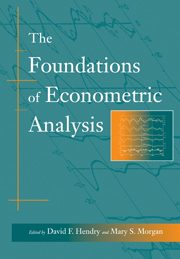Book contents
- Frontmatter
- Contents
- Preface
- Acknowledgements
- Introduction
- Bibliography
- I The Emerging Role of Econometrics in Economics
- 1 The Scope and Method of Political Economy (Macmillan, London, 1891, pp. 313–14, 320–31)
- 2 Business Cycles (California University Memoirs, vol. III, Berkeley, 1913, pp. 19–20, 449–51)
- 3 Economic Cycles – Their Law and Cause (Macmillan, New York, 1914, pp. 66–8, 84–8 (cut))
- 4 An Essay on the Nature and Significance of Economic Science (Macmillan, London, 1932, pp. 98–105)
- 5 The Common Sense of Econometrics (Econometrica, vol. 1, 1933, pp. 5–12)
- II Early Time-Series Analysis
- III Applied Econometrics and the Identification Problem
- IV The Evolution of Statistical Thinking in Econometrics
- V Dynamic Models
- VI The Tinbergen Debate
- VII Structure and Simultaneity
- VIII The Probabilistic Revolution
- IX Exogeneity
- Index
1 - The Scope and Method of Political Economy (Macmillan, London, 1891, pp. 313–14, 320–31)
Published online by Cambridge University Press: 05 June 2012
- Frontmatter
- Contents
- Preface
- Acknowledgements
- Introduction
- Bibliography
- I The Emerging Role of Econometrics in Economics
- 1 The Scope and Method of Political Economy (Macmillan, London, 1891, pp. 313–14, 320–31)
- 2 Business Cycles (California University Memoirs, vol. III, Berkeley, 1913, pp. 19–20, 449–51)
- 3 Economic Cycles – Their Law and Cause (Macmillan, New York, 1914, pp. 66–8, 84–8 (cut))
- 4 An Essay on the Nature and Significance of Economic Science (Macmillan, London, 1932, pp. 98–105)
- 5 The Common Sense of Econometrics (Econometrica, vol. 1, 1933, pp. 5–12)
- II Early Time-Series Analysis
- III Applied Econometrics and the Identification Problem
- IV The Evolution of Statistical Thinking in Econometrics
- V Dynamic Models
- VI The Tinbergen Debate
- VII Structure and Simultaneity
- VIII The Probabilistic Revolution
- IX Exogeneity
- Index
Summary
‘On Political Economy and Statistics’
It is, indeed, necessary to recognize a theory of statistics, dealing with what may be called the technique of the statistical method, that is to say, the conditions that statistical data must fulfill, the modes in which they are to be ascertained and collected, the manner of their arrangement and employment for purposes of reasoning, the criteria determining the validity of arguments based upon them, and the logical character of the conclusions established by their aid. But all this is really antecedent to the actual use of statistics for any particular purpose. The whole discussion constitutes, not a separate science, but a special branch or department of inductive logic or methodology – that is, of the science or art which treats of scientific method in general.
2 Statistics regarded as a method In seeking to define statistics regarded as a method, it 320 is convenient to adopt the somewhat clumsy phrase already quoted from Dr Mayr, and say that it is a scientific method based on the quantitative observation of aggregates. It is, in the first place, a method based on observation. It goes direct to facts, which it collects and systematically arranges. It is, in the second place, based on an observation of quantities. It deals with phenomena that are measurable, and hence capable of numerical expression. It is, in the third place, concerned with aggregates, as distinguished from individuals or units.
- Type
- Chapter
- Information
- The Foundations of Econometric Analysis , pp. 85 - 90Publisher: Cambridge University PressPrint publication year: 1995



